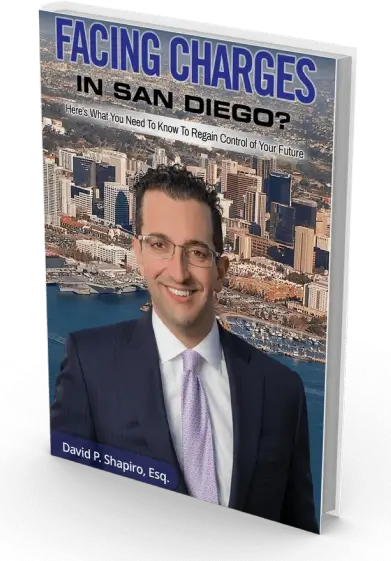Possession for Sale of Controlled Substances Under Health and Safety Code § 11351

Facing charges for possession of controlled substances for sale in California can turn your life upside down. Unlike simple possession charges, which were largely reduced to misdemeanors under Proposition 47, possession for sale remains a serious felony with potential prison time and lifelong consequences.
At David P. Shapiro Criminal Defense Attorneys, we’ve defended countless clients throughout San Diego and Chula Vista against these serious drug charges. This guide explains what you need to know if you’re facing possession for sale charges under Health and Safety Code § 11351.
What Makes Possession for Sale Different from Simple Possession?
Health and Safety Code § 11351 specifically prohibits possessing or purchasing controlled substances with the intent to sell them. This is distinctly different from simple possession (Health and Safety Code § 11350), which covers possession for personal use only.
One critical misconception worth clearing up immediately: You do not need to be caught in the act of selling drugs to be charged with possession for sale.
Prosecutors can file possession for sale charges based entirely on circumstantial evidence that suggests your intent to distribute the controlled substance. This makes these cases particularly dangerous and complex to defend against.
Which Drugs Are Covered Under Health and Safety Code § 11351?
Health and Safety Code § 11351 applies to numerous controlled substances, including:
- Cocaine and cocaine base (crack)
- Heroin
- Opiates and opium derivatives
- Hallucinogens like LSD
- Various prescription opioids (when possessed without a valid prescription)
- Other narcotics listed in Schedules III, IV, or V
Different statutes cover other substances—for example, Health and Safety Code § 11378 applies to possession for sale of methamphetamine and certain other controlled substances.
How Prosecutors Prove Possession for Sale Charges
To secure a conviction under Health and Safety Code § 11351, prosecutors must prove beyond a reasonable doubt that:
- You possessed or purchased a controlled substance
- You knew of the substance’s presence
- You knew of the substance’s nature as a controlled drug
- You possessed or purchased the substance with the intent to sell it
- The amount was usable (more than residue)
The fourth element—intent to sell—is what distinguishes this offense from simple possession and makes it particularly challenging to defend against.
Key Evidence Used to Prove Intent to Sell
When you haven’t been caught actively selling drugs, prosecutors typically rely on circumstantial evidence to prove your intent to sell, including:
Quantity of Drugs
One of the strongest indicators of sales intent is the quantity of drugs found. Larger amounts than typically used for personal consumption suggest an intent to distribute.
Packaging Materials and Methods
Multiple small baggies, digital scales, and packaging equipment suggest preparation for sales rather than personal use.
“Pay-Owe” Sheets
Documentation of transactions, customer lists, or records of amounts owed can be powerful evidence of sales activity.
Cash
Large amounts of cash, particularly in small denominations, often indicate drug sales.
Cell Phone Evidence
Text messages, photos, and call logs on your phone may contain evidence of drug transactions or communications with buyers.
Multiple Types of Drugs
Possessing various types of controlled substances can suggest sales rather than personal use.
Absence of Use Paraphernalia
If you possess drugs but have no paraphernalia for personal use (pipes, needles, etc.), this might suggest the drugs weren’t for personal consumption.
Expert Testimony
Law enforcement “experts” frequently testify about how the evidence in your case fits patterns typical of drug sales operations.
Penalties for Possession for Sale Convictions
Health and Safety Code § 11351 carries severe penalties:
- Prison Time: Two, three, or four years in prison
- Fines: Up to $20,000 for certain offenses
- Felony Probation: May be available in some cases, depending on the amount and any criminal history
Additionally, unlike simple possession, a conviction for possession for sale:
- Is always a felony (not reducible to a misdemeanor)
- May lead to asset forfeiture
Collateral Consequences Beyond Court Penalties
A conviction under Health and Safety Code § 11351 creates ripple effects throughout your life:
- Employment Barriers: Most employers conduct background checks and are hesitant to hire those with drug sales convictions
- Housing Obstacles: Landlords frequently reject applicants with drug sales backgrounds
- Professional Licensing Issues: Many licensed professionals (doctors, nurses, teachers, etc.) face license revocation
- Immigration Consequences: For non-citizens, drug sales convictions often trigger deportation proceedings or inadmissibility
- Educational Impacts: Federal student aid eligibility may be affected
- Firearm Rights: Loss of right to own or possess firearms
Powerful Defense Strategies for Possession for Sale Charges
Despite the serious nature of possession for sale charges, several defense strategies may be effective:
Fourth Amendment Violations
Many drug cases begin with searches of homes, vehicles, or persons. If police violated your Fourth Amendment rights during the search, we can file a motion to suppress the resulting evidence, potentially leading to dismissal.
Common violations include:
- Searches without valid warrants
- Illegal traffic stops
- Searches that exceed the scope of consent
- Extended detentions without reasonable suspicion
Challenging Possession or Knowledge
We may argue that you:
- Didn’t have control over the drugs
- Didn’t know the drugs were present
- Were unaware of the nature of the substance
Attacking Evidence of Intent to Sell
Even if possession is proven, we can challenge the evidence suggesting intent to sell:
- The quantity was consistent with personal use
- Packaging materials had legitimate purposes
- Cash came from legal sources
- Multiple people had access to phones or areas where evidence was found
Entrapment
If police or their informants induced you to commit a crime you wouldn’t otherwise have committed, this may constitute entrapment.
Challenging Chain of Custody
Problems with how evidence was collected, stored, or processed can undermine the prosecution’s case.
Why Standard Drug Diversion Programs Don’t Apply
Unlike simple possession charges, possession for sale charges are not eligible for drug diversion programs like PC 1000 or Proposition 36. This highlights the importance of fighting these charges vigorously from the beginning.
However, with effective representation, you may be able to negotiate a plea to simple possession, which would then make diversion programs available.
Beyond ‘Not Guilty’: Negotiating Alternatives When Evidence Is Strong
Even when the evidence appears overwhelming, an experienced defense attorney can often negotiate more favorable outcomes:
- Reduced charges (such as simple possession)
- Felony probation instead of prison time
- Drug treatment in lieu of longer incarceration
- Split sentences (partial prison time, partial supervised release)
These negotiations require thorough knowledge of local courts, prosecutors, and sentencing practices in San Diego and Chula Vista.
Why Local Criminal Defense Experience Matters for Drug Sales Cases
Drug enforcement practices vary significantly from county to county in California. San Diego, with its proximity to the border, has particular approaches to drug sales prosecutions that differ from other regions.
An attorney who regularly handles drug cases in San Diego County courts will be familiar with:
- Local prosecutors’ plea bargaining tendencies
- Judges’ sentencing patterns
- Diversion program availability and requirements
- San Diego-specific drug task force procedures
How David P. Shapiro Criminal Defense Attorneys Can Help
When facing possession for sale charges, your choice of attorney can make a profound difference in the outcome of your case. Our defense team offers:
- Thorough case evaluation: We meticulously review all evidence, identifying vulnerabilities in the prosecution’s case
- Constitutional rights protection: We scrutinize police conduct for Fourth Amendment violations
- Strategic negotiation: We leverage our relationships and reputation to secure more favorable outcomes
- Aggressive trial advocacy: When necessary, we provide skilled courtroom representation
- Client-centered approach: We tailor our defense strategy to your specific circumstances and goals
Our approach has helped many clients facing possession for sale charges achieve outcomes far better than initially seemed possible.
Crucial First Steps If You’re Under Investigation
If you suspect you’re under investigation for drug sales, or if you’ve already been arrested:
- Exercise your right to remain silent – Anything you say can and will be used against you
- Do not consent to searches if officers ask for permission
- Request an attorney immediately – Say clearly, “I want to speak with my attorney”
- Do not discuss your case with anyone except your attorney, including cellmates or friends
- Document your recollection of all police interactions as soon as possible
- Contact an experienced defense attorney without delay
The earlier an attorney gets involved, the more opportunities exist to influence the direction of your case.
Get Experienced Drug Defense Representation Today
If you or someone you love is facing criminal charges in California, swift action is imperative. The penalties can be life altering and long lasting. Give us a call today to set up a case evaluation with one of our attorneys and learn how to best protect your freedom and future.
Too often, we see clients who “wait and see,” unsure of the legal landscape ahead, only for charges to escalate. They then find themselves backpedaling into a bad defense and an even worse lawyer. Don’t let that happen to you. Protect your freedom. Protect your future. Know your rights.
The contents of this article and blog are meant for informational and marketing purposes only and do not constitute legal advice. Viewing and/or use of the blog does not form an attorney-client relationship. No statements in this post are a guarantee, warranty, or prediction of a particular result in your case.









